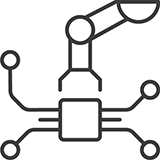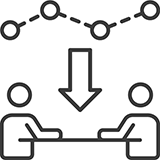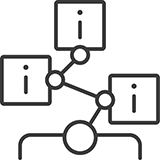The project identified eight key driving forces deemed to substantially influence the development of the two analysed types of platform work by 2030: technology, the labour market, consumer protection, labour regulation, sector regulation, information obligations relating to tax and social insurance authorities, platform ownership/governance, and platform business models. Based on assumed developments of these driving forces, 10 possible future scenarios were derived.
Technology
Technology develops quickly, fostered in part by EU and national initiatives in the digital era. For example, EU, national and regional funding programmes supporting innovation, notably related to the development and deployment of technologies, are increased and efforts to make them accessible and effective for research and business are taken.
5G mobile technology, the Internet of Things (IoT), robotics, electronic and autonomic vehicles, 3D printing, and augmented and virtual reality have reached a level of technological and market maturity that allows for their widespread deployment in the economy and society. Interconnectivity between technologies as well as competencies and capacities to develop and implement algorithms, data storage and data analytics have developed and are widespread. This increases use of and demand for platform work, the clientele of which is now not only private individuals and households, but also a large share of businesses using platforms as a tool in their work organisation (outsourcing).
At the same time, demand for some services mediated through platforms decreases, including transport services that can be provided by autonomous vehicles (platform-determined work) and household services that can be done by robots or by the individuals themselves assisted by 3D-printed parts, augmented and virtual reality (worker-initiated work). From a supply-side perspective, the advances in electric bikes and virtual reality facilitate platform work for a larger group of workers: electric bikes enable less physically fit people to engage in platform-determined work, and virtual reality enriches skills development in worker-initiated platform work.
Labour market
The potential inherent to the fast technological development results in continued economic recovery, linked to new business models and the types of products and services offered in traditional and platform economies. Accordingly, labour demand exceeds supply, which is also due to demographic and societal developments. This enhances workers’ position in the labour market, and they can choose among employment offers. Employment and working conditions improve as employers strive to secure their workforces. This also holds true for platform work. Both platforms and clients are incentivised to offer good conditions to get their service needs covered.
The improvement of employment and working conditions notably benefits platform-determined workers, but it also more generally promotes entrepreneurialism. This is because there is less reluctance to engage in platform work, and more workers take the opportunity to use worker-initiated work to try out self-employment, and to learn and apply their skills and capacities in the economy (both traditional and platform). Such attitudes and competences further enhance economic development, Europe’s competitive situation and innovation potential.
Consumer protection
As platform work continues to grow and is recognised to take an increasingly influential role in the economy and labour market, regulators at EU and national levels increasingly commit to regulating platform work. The aim is to capitalise on the potential merits while safeguarding standards developed over previous decades in the traditional economy.
Accordingly, EU-level regulation requires platforms to inform clients about the status of the worker (professional versus non-professional service provider) so that clients know who is liable in case of an incident. This enhanced transparency, and hence security, is expected to positively influence clients’ (private individuals and households) willingness to use platform work.
Peer-to-peer providers will consider offering additional insurance as an incentive for clients to assign them tasks, in an effort to remain competitive in a market with a growing number of platform workers. The insurance sector benefits from offering specific packages for platform workers. Additional costs arising from such insurance are passed on to the client as demand exceeds supply, hence allowing workers to increase prices to cover emerging expenditure.
Labour regulation
While the employment status of platform workers (that is, whether they are employees or self-employed) remains unclear, the EU establishes a common approach of minimum labour standards for all, including social protection and access to representation. This means that platform workers benefit from the same minimum standards and protections as workers in the traditional economy, for example, related to accident, sickness, unemployment and pension insurance; payment at market prices; and health and safety. However, employment law tends to set higher standards and protections for employees. Hence, while the situation for self-employed improves, they continue to bear a higher level of responsibility for their own labour conditions. As it is likely that the majority of platform workers continue to be considered self-employed, this development is more beneficial for the worker-initiated type (whose workers tend more to be genuine self-employed) than for the platform-determined type (where the risk of misclassification of employment status is higher).
The responsibility for ensuring the minimum labour standards rests with the platforms, adding to their administrative and financial burden. Platforms will seek ways to pass on this burden to the clients, for example by increasing matching fees. This increases competition among platforms – the ones offering the overall most attractive services to clients will benefit. This triggers innovation in the business models of platforms and a healthier market situation in the platform economy.
Sector regulation
Another regulatory clarification is that of the sector attribution of platforms, where a specific trade regulation for platforms is defined: ‘matching services’. This takes into account the particularities of this business model and employment form, as well as its competitive position regarding related sectors in the traditional economy – for example, temporary work agencies, transport (in the case of platform-determined work) and construction (in the case of worker-initiated work).
This sector regulation sets clear standards for entering and doing business in the platform economy and considers its impact on the traditional economy and society. This not only helps to level the playing field for actors within the platform economy and between the platform and the traditional economies, but also avoids negative societal effects thanks to transparent and clear standards. Furthermore, the clear attribution of platforms to a specific sector fosters social dialogue and collective bargaining. Representation of platform workers becomes stronger, and effective negotiations between workers and platforms, or among their representatives, take place.
Information obligations regarding tax and social insurance
The EU builds a framework to clarify platforms’ obligations to report information on workers’ earnings, for tax and social protection purposes. Implementation is left to the discretion of Member States: they decide which platforms should declare, the type of information required and the mechanisms for declaration. Most likely, this leads to a diversity of approaches across Member States.
From the perspective of the platforms, this is an incentive to be active in those Member States in which requirements are less burdensome. From a state and societal perspective, stricter information obligations can contribute to reducing undeclared work and to limiting state income loss due to evasion of taxes and social insurance contributions. At the same time, some countries opt to alleviate the administrative burden of platforms to attract new platform dynamics for competing with other countries.
Platform ownership and governance
The platform economy remains dominated by non-EU platforms that follow a shareholder-value model that aims to maximise profits. This makes it challenging to impose EU or national legislation on the platforms. These platforms, furthermore, find creative approaches to circumvent regulations that reduce their shareholders’ profits – which tend to be spent outside of Europe.
However, the strong position of the existing platforms and their networking capability binding workers and clients to them (‘lock-in effect’) weakens due to the high demand and increasing task diversity. New, indigenous platforms have good potential to successfully start up and reach a competitive scale and scope. Such a situation is likely to improve the market position of workers.
Platform business model
Encouraged by these developments, the platform economy expands further. In addition, online labour platforms will diversify their fields of activity to compensate for the loss in business for ‘traditional’ platform tasks, which are increasingly automated.
Platform-determined tasks expand beyond food delivery to the delivery of goods, including parcel and mail delivery, while worker-initiated tasks are offered for additional types of household services, including care and personal services as they are more difficult to automate.
Consumers will get more familiar with services mediated through platforms, resulting in increased acceptance and higher competition with similar services in the traditional economy.









